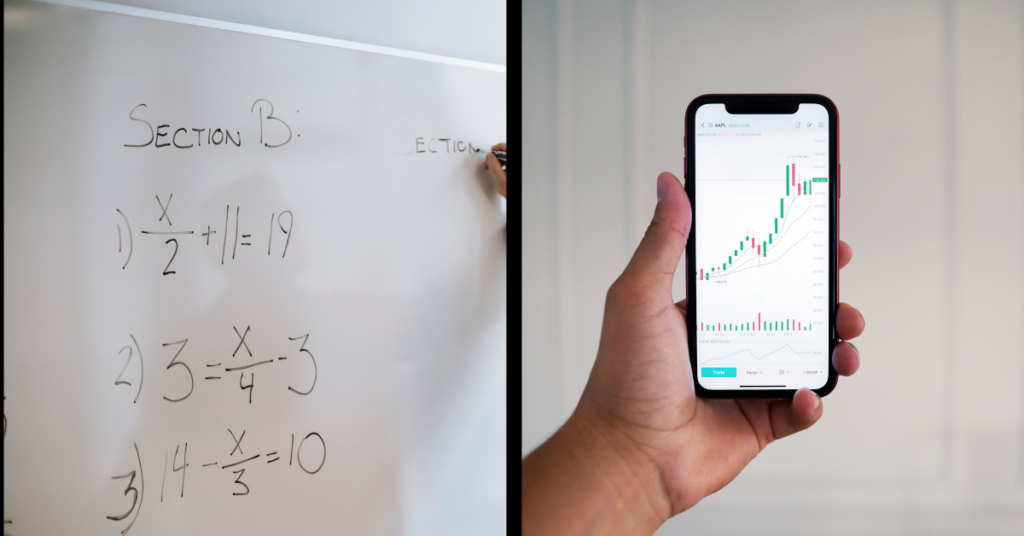
Do Traders Need to Be Good at Mental Math?
Do traders need to be good at mental math? It is a common myth that you need to be an expert mathematician to become a successful trader since it involves numbers. While this is partially true, you can still work your way around to be profitable in trading.
Let’s first understand the uses of math in trading. This will help you decide if trading isn’t a good fit for you. You may indeed need to use math to calculate a few things.
Calculations
While trading in the real market, everyone might be aware of the fact that you need to calculate profit and loss. But there’s more to it if you want to survive in the market. Let’s look at different scenarios where you might need to calculate.
You know the entry price and exit price; you want to calculate the profit and loss. This is done by subtracting the exit price from the entry price and multiplying the result by the quantity of shares.
You have decided on the entry price, but you are yet to decide on the exit price. You may want to calculate the exit price based on the risk-reward ratio, keeping in mind the money management rules too. In this situation, you need quick calculations if you are a scalper or a day trader, as the exit price will determine your profit or loss.
The third scenario is, as in my case, where you may want to calculate everything before entering the trade. I usually determine the entry price, ATR, swing point, and calculate the quantity, stop loss, target, trailing stop loss, etc. I check if it meets my management rules only then I take the trade.
You may also want to calculate the number of shares or contracts based on account size and risk per trade.
You may want to calculate the capital required for trading or diversification.
Or determine margin required for leveraged positions. Assessing impact of margin changes on trading strategies.
Or just to interpret mathematical indicators like RSI or MACD.
Another scenario is when you want to calculate things like drawdown while backtesting.
The most important scenario is during options trading. You need to calculate the exit price or create a strategy based on the Greeks like delta and theta, and also volatility. You may also want to consider calculating the breakeven price based on your entry price.
After the trade, you may want to calculate percentage returns, monthly returns, returns by asset, etc.
Tips
In trading, quick mental math is crucial for making fast decisions, especially for scalpers.
However, traders with higher timeframes can comfortably use calculators on sites or custom tools like Notion databases for their calculations.
For scalpers, the challenge of using a calculator comes when they need to swiftly switch between the trading platform and a calculator. This is because they aim to enter and exit trades within minutes or even seconds.
If you’re a scalper, practicing mental math in a demo trading setting can help you get faster over time.
Technology also plays a big role for all traders. Using automation tools and algorithms can handle calculations and even execute trades. This is particularly useful for scalpers who need speedy decision-making.
Besides technology, traders, especially scalpers, can try relaxation techniques like meditation or breathing exercises. This helps manage stress, ensuring that your brain works at its best during fast-paced trading.
In the end, whether you rely on mental math, calculators, or automation depends on your trading style and the demands of your strategy.
Conclusion
To sum it up, math plays a diverse role in trading, depending on your style. For quick decision-making, especially if you’re a scalper, mental math is handy. But if you’re more comfortable, traders of all types can use calculators or custom tools for their calculations.
Technology is a big help for everyone. Automation tools and algorithmic trading not only make calculations easier but also automate the whole trading process. This is a big advantage for scalpers who need to act fast.
Options trading adds another layer of complexity, with calculations involving Greeks and volatility. After a trade, it’s important for traders to figure out their percentage returns, monthly returns, and returns by asset.
In the end, whether you go for mental math, calculators, or automation depends on your style. Understanding how math fits into your strategy equips you to navigate the ever-changing world of financial markets.
Resources & Links
Tradingview – Charting Platform
Zerodha – Trading brokerage platform (India)
Disclaimer
Trading involves substantial risk, and past performance is not indicative of future results. Always conduct your own research and consider seeking professional advice before making any investment decisions. The information provided on this platform about digital entrepreneurship is based on the author’s experiences and industry knowledge. It should not be considered as financial, legal, or business advice. Please consult with experts in these fields before making business decisions. This blog may contain affiliate links, and we may earn a commission if you make a purchase through these links. Your support is appreciated.
